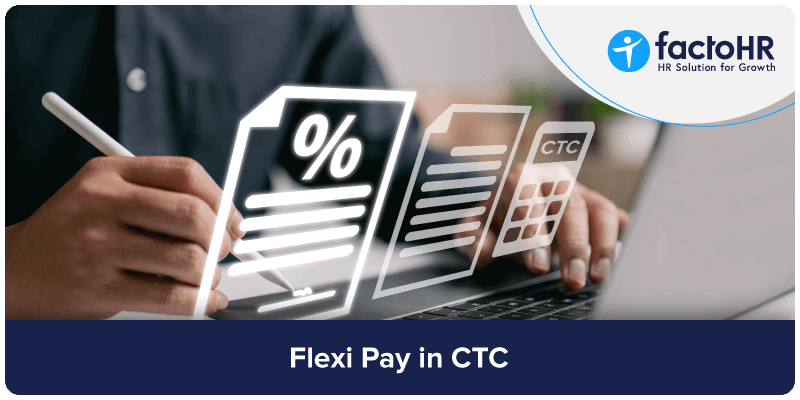What is Flexi Pay in CTC?

Table of Contents
In today’s competitive job market, attracting and retaining top talent has become a primary concern for businesses of all sizes and industries. To create a compelling value proposition and stay ahead in the talent acquisition game, organizations are adopting innovative approaches to compensation and benefits. One such approach is the implementation of Flexi Pay in Cost to Company (CTC) packages. Flexi Pay offers employees the freedom to personalize their salary components according to their individual needs and preferences, providing a new level of flexibility and empowerment. In this article, we will explore the concept of Flexi Pay in CTC, its working mechanism, benefits for both employees and employers, considerations for implementation, and its significance in the modern workforce.
What is Flexi Pay?
Flexi Pay, also known as Flexible Pay or Flexi Salary, is a progressive compensation concept that seeks to redefine the traditional pay structure. Unlike rigid salary models, Flexi Pay empowers employees to exercise control over their salary components within the CTC framework. It allows individuals to customize how their earnings are distributed, tailoring their compensation to suit their unique requirements and financial goals.

How Does Flexi Pay Work?
Flexi Pay operates on the fundamental principle of flexibility and choice. It enables employees to allocate their salary components according to their preferences and priorities. Rather than adhering to a fixed salary structure, individuals have the freedom to distribute their earnings across various components such as basic salary, allowances, bonuses, and reimbursements. This customization empowers employees to shape their compensation package in a way that aligns with their specific needs and goals.
Benefits of Flexi Pay
Flexi Pay brings several advantages for both employees and employers alike. Let’s explore some of the key benefits:
Enhanced Financial Flexibility
Flexi Pay allows employees to exercise greater control over their finances by tailoring their compensation to align with their financial goals and obligations.
Tax Efficiency
By structuring salary components, employees can optimize their tax liabilities, potentially reducing their tax burden and increasing their take-home pay.
Work-Life Balance
Flexi Pay recognizes the diverse needs of employees, enabling them to allocate funds towards benefits that support their personal lives. This promotes a healthier work-life balance and overall well-being.
Employee Motivation and Satisfaction
The ability to personalize compensation fosters a sense of empowerment and recognition, leading to increased employee motivation, satisfaction, and loyalty.
Customized Compensation
Flexi Pay allows employers to design compensation packages that cater to the unique needs and preferences of individual employees, enhancing the perceived value of the overall remuneration.

Challenges of Implementing Flexi Pay
While Flexi Pay offers numerous advantages, there are some considerations for employers to keep in mind during implementation:
Administrative Challenges
Implementing Flexi Pay requires robust systems and processes to handle the customization and tracking of salary components. Employers need to ensure they have the necessary infrastructure in place to effectively manage these complexities.
Communication and Education
Clear communication and education programs are essential to help employees understand the available Flexi Pay options and make informed decisions regarding their salary structure. Employers should proactively educate their workforce about the benefits and mechanics of Flexi Pay.
Legal and Tax Compliance
Flexi Pay structures must comply with applicable legal and tax regulations. Employers should stay updated with the legal framework and ensure that the offered options adhere to relevant laws and regulations to avoid any legal or compliance issues.
Conclusion
Flexi Pay in CTC is a forward-thinking compensation strategy that empowers employees by offering flexibility and control over their salary components. By personalizing their compensation packages, individuals can achieve a better work-life balance, maximize their financial well-being, and experience higher job satisfaction. Flexi Pay provides employers with a competitive edge in attracting and retaining top talent while aligning compensation with individual needs and goals. As the modern workforce continues to evolve, Flexi Pay emerges as a valuable tool for creating mutually beneficial relationships between employees and organizations.
Flexi Pay provides a mutually beneficial setup for both employers and employees, but implementing and managing these plans demands meticulous consideration and accurate payroll processing. Organizations considering flexible pay should explore factoHR’s payroll software, which can help ensure seamless integration with existing systems and more streamlined administration. By automating calculations, managing diverse salary components efficiently, and minimizing errors, companies can implement Flexi Pay plans more effectively and maximize their overall payroll process efficiency.

FAQs
1. How does Flexi Pay impact tax liabilities?
Flexi Pay enables employees to optimize their tax liabilities by customizing salary components, potentially reducing their overall tax burden.
2. Can employees change their Flexi Pay allocation periodically?
Yes, one of the key features of Flexi Pay is its flexibility. Employees can make changes to their salary components based on their evolving needs and priorities.
3. How does Flexi Pay impact employee benefits?
Flexi Pay allows employees to allocate funds towards different benefit categories such as healthcare, retirement plans, or insurance. The impact on benefits may vary based on the organization’s policies and the choices made by employees.
4. Is Flexi Pay a one-time decision or can employees make changes throughout the year?
Flexi Pay is designed to accommodate changes in employees’ circumstances and priorities. Generally, employees have the option to review and modify their salary components periodically, ensuring their compensation remains aligned with their needs.
5. How can employers measure the success of the Flexi Pay program?
Employers can evaluate the success of the Flexi Pay program through various metrics such as employee satisfaction surveys, retention rates, and feedback on the program’s impact on work-life balance and financial well-being.
Grow your business with factoHR today
Focus on the significant decision-making tasks, transfer all your common repetitive HR tasks to factoHR and see the things falling into their place.

© 2026 Copyright factoHR


